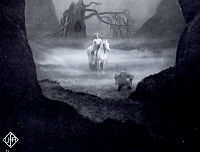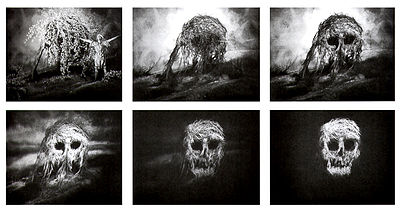- Die Nibelungen
-
For the 2004 film by Uli Edel, see Dark Kingdom: The Dragon King.
Die Nibelungen 
Original 1924 film posterDirected by Fritz Lang Produced by Erich Pommer Written by Fritz Lang
Thea von HarbouStarring Paul Richter
Margarete Schön
Hanna Ralph
Bernhard Goetzke
Theodor Loos
Rudolf Klein-Rogge
Rudolf Rittner
Hans Adalbert von Schlettow
Georg August Koch
Georg JohnMusic by Gottfried Huppertz Cinematography Carl Hoffman
Günther Rittau
Walter RuttmannStudio Decla-Bioscop Distributed by UFA Release date(s) February 14, 1924 (Pt 1)
April 26, 1924 (Pt2)Running time 143 min. (1st part)
145 min. (2nd part)Country Germany Language Silent film
German intertitlesDie Nibelungen is a series of two silent fantasy films created by Austrian director Fritz Lang in 1924: Die Nibelungen: Siegfried and Die Nibelungen: Kriemhild's Revenge.
Both films were co-written by Lang's then-wife Thea von Harbou, based upon the epic poem Nibelungenlied written around AD 1200.[1] Siegfried was released in the U.S. on 23 August 1925, premiering at the Century Theatre in New York City in the short-lived Phonofilm sound-on-film process. Kriemhild's Revenge was released in the U.S. in 1928.
Contents
Plot summary
Die Nibelungen: Siegfried
The title character Siegfried, son of King Siegmund of Xanten, masters the art of forging a sword at the shop of Mime. Mime sends Siegfried home, but while preparing to leave, Siegfried hears the tales of the kingdom of Burgundy, the kings who rule there, as well as of Kriemhild, the princess of Burgundy. Siegfried announces he wants to win her hand in marriage, much to the amusement of the smiths. By way of physical violence, Siegfried demands to be told the way. Mime, who is envious of Siegfried's skill as a swordsmith, claims there is a shortcut through the Wood of Woden; in reality, this route will lead Siegfried away from Burgundy and expose him to attack from the magical creatures inhabiting the wood. During his journey, Siegfried discovers a dragon, and deviates from his path to slay it. He touches its hot, yellow blood and understands the language of the birds, one of which tells him to bathe in the dragon's blood in order to become invincible to attack — except for one spot on his shoulder blade, which is missed after being covered by a falling lime leaf.
Soon after, the powerful Siegfried trespasses on the land of the Nibelungs and is attacked by Alberich, King of the Dwarves. Siegfried defeats Alberich, who offers Siegfried a net of invisibility and transformation. Siegfried is not persuaded to spare Alberich's life, whereupon Alberich offers to make Siegfried "the richest king on earth!" [intertitle 1.14]. While Siegfried is mesmerized by the treasure, Alberich tries to defeat him, but dies in the attempt. Dying, Alberich curses all inheritors of the treasure and he and his dwarves turn to stone.
Siegfried finally arrives in Burgundy in his new guise of the King of twelve kingdoms. A battle breaks out between Siegfried and King Gunther and his adviser Hagen of Burgundy, which is subdued by the appearance of the beautiful princess Kriemhild. Hagen negotiates over Siegfried helping Kriemhild's brother, King Gunther, to win the hand of Brunhild, the Queen of Iceland. The men travel to Brunhild's kingdom, where Siegfried feigns vassalage to Gunther so that he can avoid Brunhild's challenge and instead use the net's power of invisibility to help Gunther beat the powerful Queen in a threefold battle of strength. The men return to Burgundy where Gunther marries Brunhild and Siegfried weds Kriemhild.
Brunhild is not, however, completely defeated. She suspects deceit and refuses to consummate the marriage. Hagen again convinces Siegfried to help. Siegfried transforms himself into Gunther and battles Brunhild and removes her arm-ring during battle, after which she submits to his will. Siegfried leaves the real Gunther to consummate the marriage.
Kriemhild discovers Brunhild's armlet and asks Siegfried about it. Siegfried discloses the truth to Kriemhild about his role in Brunhild's defeat. When the Nibelungen treasure that Siegfried acquired from Alberich arrives at the court of Burgundy as Kriemhild's wedding gift, Brunhild becomes more suspicious about Siegfried's feigned vassalage to Gunther. Brunhild dons the Queen Mother's jewellery and proceeds to the cathedral to enter as the first person, as is her right as Queen of Burgundy. Kriemhild tries to take Brunhild's right of way and an argument erupts between the two Queens. Kriemhild betrays her husband's and brother's secret to Brunhild, who then confronts Gunther. Brunhild demands that Siegfried must be killed, which she justifies by claiming that Siegfried stole her maidenhood [intertitle 1.94] when he struggled with her on her wedding night. Hagen von Tronje and King Gunther conspire to murder Siegfried during a hunt in the Odenwald. Hagen deceives Kriemhild into divulging Siegfried's weak spot by sewing a cross on the spot in Siegfried's tunic.
After the hunt, Hagen challenges Siegfried to a race to a nearby spring. When Siegfried is on his knees drinking, Hagen pierces him from behind with a spear.
In an evil twist of bitter revenge, Brunhild confesses that she lied about Siegfried stealing her maidenhood in order to avenge Gunther's deceit of her.
Kriemhild demands her family avenge her husband's death at the hands of Hagen, but her family is complicit in the murder, and so they protect Hagen. Kriemhild swears revenge against Hagen while Brunhild commits suicide at the foot of Siegfried's corpse, which has been laid in state in the cathedral.
Die Nibelungen: Kriemhilds Rache
Kriemhild tries to win over the people of Burgundy to help her exact revenge against Hagen, to whom her brothers have sworn allegiance. Kriemhild bribes the people with money and treasure from the Nibelungen hoard. Margrave Ruediger of Bechlarn arrives unannounced to woo Kriemhild on behalf of his King, King Etzel, who resides in the land of the Huns. Kriemhild initially declines, but ultimately she recognises the opportunity for revenge in her marriage with Etzel and in Ruediger's allegiance to her. She forces Ruediger to swear allegiance to her on his sword. At that very moment, news arrives that Hagen has stolen her wedding gift, the Nibelungen hoard, which Hagen has, unbeknownst to all, sunk into the Rhine river.
Kriemhild travels to Etzel's lands and accepts his hand. As a gift to Kriemhild for bearing him a son, Ortlieb, Etzel grants her a wish. Kreimhild requests Etzel to invite her family to celebrate the Midsummer Solstice with them in the Hun kingdom. In the meantime, Kriemhild bribes Etzel's Hun warriors with money and treasure to avenge her and attack Hagen.
When the Burgundians arrive, the Huns launch several unsuccessful attempts. Instead, the Huns instead launch an attack on the Burgundian soldiers during their feast in the subterranean caves where the Huns reside. The Burgundian Knight Dankwart manages to escape the melee and warns the Burgundian Kings who are feasting with Etzel and Kriemhild in Etzel's palace. Upon hearing of the treacherous attack, Hagen murders Etzel's son, and battle breaks out. Dietrich of Bern manages to negotiate an exit from the hall for Etzel's royal entourage, which leaves the Burgundian guests imprisoned in Etzel's palace.
The remaining 60 minutes of the film consists of multiple battles in which the Huns launch multiple attacks on the Burgundians. Kriemhild offers her family freedom if they surrender Hagen to her. They decline. Ultimately Kriemhild calls upon Ruediger to fulfill his oath of allegiance by attacking Hagen. Ruediger refuses, but is forced to by Etzel. Ruediger and Kriemhild's two younger brothers, Gerenot and Giselher, perish in the battle. In a final act of desperation, Kriemhild commands the palace be set alight.
As the flames smoulder, only Gunther and Hagen survive. Dietrich of Bern fetches the two remaining men from the palace and delivers them to Kriemhild, who demands Hagen to reveal the hiding place of the Nibelungen hoard. When Hagen states that he has sworn not to reveal the hiding place as long as one of his kings is still alive, Kriemhild commands Gunther's beheading. When Hagen reveals that no one now knows the location of the treasure apart from him, and that he will never tell, Kriemhild grabs Siegfried's sword from Hagen and cuts him down. Infuriated by Kriemhild's act of murder, Sword Master Hildebrant stabs Kriemhild from behind. Etzel's final words are that Kriemhild should be taken back home to her dead husband, Siegfried, because she never belonged to any other man [intertitle 2.159].
Cast
Actor Role Paul Richter Siegfried Margarete Schön Kriemhild Hanna Ralph Brunhild Hans Adalbert von Schlettow Hagen von Tronje Bernhard Goetzke Volker von Alzey Theodor Loos King Gunther Rudolf Klein-Rogge King Etzel Rudolf Rittner Markgraf Rudiger von Bechlorn Georg August Koch Hildebrand References
- ^ Jeff Krispow (10-91). "DIE NIBELUNGEN: SIEGFRIED". http://www.laserrot.com/. http://www.laserrot.com/ldreviews/us/d/id7395ds.html. Retrieved 2006-12-07.
External links
- Die Nibelungen at SilentEra
- Die Nibelungen: Siegfried at AllRovi
- Die Nibelungen: Kriemhilds Rache at AllRovi
- Die Nibelungen: Siegfried at the Internet Movie Database
- Die Nibelungen: Kriemhilds Rache at the Internet Movie Database
- Die Nibelungen: Siegfried at Rotten Tomatoes
- Die Nibelungen: Kriemhilds Rache at Rotten Tomatoes
Films directed by Fritz Lang Filmography 1919-
1933Halbblut · Der Herr der Liebe · The Spiders, Part 1 · Harakiri · The Spiders, Part 2 · Das wandernde Bild · Vier um die Frau · Destiny · Dr. Mabuse the Gambler · Die Nibelungen: Siegfried · Die Nibelungen: Kriemhilds Rache · Metropolis · Spione · Woman in the Moon · M · The Testament of Dr. Mabuse1934-
1956Liliom · Fury · You Only Live Once · You and Me · The Return of Frank James · Western Union · Man Hunt · Moontide · Hangmen Also Die! · Ministry of Fear · The Woman in the Window · Scarlet Street · Cloak and Dagger · Secret Beyond the Door · House by the River · American Guerrilla in the Philippines · Rancho Notorious · Clash by Night · The Blue Gardenia · The Big Heat · Human Desire · Moonfleet · While the City Sleeps · Beyond a Reasonable DoubtLater Categories:- 1924 films
- German films
- Black-and-white films
- Films directed by Fritz Lang
- Films of Weimar Germany
- Silent films
- Fantasy films
- Sword and sorcery films
- Fantasy adventure films
- Epic films
- Films based on Norse mythology
- Films based upon European myths and legends
- Germany in fiction
Wikimedia Foundation. 2010.


